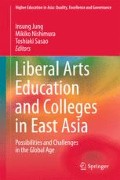Abstract
Liberal arts education had its roots in Europe. It was then taken up in the US and is now being re-imported from the US into Europe where several new liberal arts institutions , mostly public, are being established. It’s concepts and practices are now being embraced in some countries in Asia where heretofore, economic development has been the driver and vocational, rather than academic studies, have dominated the curriculum. In this book, we focus on liberal arts colleges and programs in Asia and especially East Asia where this movement is most active.
Access this chapter
Tax calculation will be finalised at checkout
Purchases are for personal use only
References
Association of American Colleges and Universities. (n.d.). What is a 21st century liberal arts education? Retrieved from http://www.aacu.org/leap/what-is-a-liberal-education.
Baker, V. L., Baldwin, R. G., & Makker, S. (2012). Where are they now? Revisiting Breneman’s study of liberal arts colleges. Liberal Education, 98(3). Retrieved from http://www.aacu.org/publications-research/periodicals/where-are-they-now-revisiting-breneman%E2%80%99s-study-liberal-arts.
Breneman, D. W. (1990). Are we losing our liberal arts colleges? AAHE Bulletin, 43(2), 3–6. Retrieved from http://files.eric.ed.gov/fulltext/ED339260.pdf.
Breneman, D. W. (1994). Liberal arts colleges: Thriving, surviving, or endangered. Washington: Brookings Institution Press.
Chopp, R. (2014). Remaking, renewing, reimagining the liberal arts college takes advantage of change. In R. Chopp, S. Frost, & D. H. Weiss (Eds.), Remaking college: Innovation and the liberal arts (pp. 13–24). Baltimore: The Johns Hopkins University Press.
Chopp, R., Frost, S., & Weiss, D. H. (Eds.). (2014). Remaking college: Innovation and the liberal arts. Baltimore: The Johns Hopkins University Press.
Cobban, A. B. (1975). The medieval universities: Their development and organization. London: Methuen.
Crutcher, R. A. (2014). The intercultural connection: Students and the liberal arts. In R. Chopp, S. Frost, & D. H. Weiss (Eds.), Remaking college: Innovation and the liberal arts (pp. 180–188). Baltimore: The Johns Hopkins University Press.
Chung, P. (2013). Foreword. In J. Xing, P. S. Ng, & C. Y. Cheng (Eds.), General education and the development of global citizenship in Hong Kong, Taiwan and Mainland China (pp. xiii–xiv). New York: Routledge.
Day, H. (2011). The value and impact of college experience: A comparative study. Annapolis: The Annapolis Group.
Ferrall, V. E. (2011). Liberal arts at the brink. Cambridge: Harvard University Press.
Green, M. F., & Siaya, L. (2005). Measuring internationalization in liberal arts colleges. Washington: American Council on Education. Retrieved from http://www.acenet.edu/news-room/Documents/Measuring-LiberalArts.pdf.
Guttenplan, D. D. (2013). In Britain, a return to the idea of the liberal arts. The New York Times. Retrieved May 12, 2013 from http://www.nytimes.com/2013/05/13/world/europe/in-britain-a-return-to-the-idea-of-the-liberal-arts.html?pagewanted=all&_r=0.
Harriman, P. (1935). Antecedents of the liberal arts college. Journal of Higher Education, 6(2), 63–71.
Janeksela, G. M. (2012). The value of a liberal arts education. Academic Exchange Quarterly, 16(4), 37–41.
Jung, I. S. (2014). Cultural influences on online learning. In I. S. Jung & C. N. Gunawardena (Eds.), Culture and online learning: Global perspectives and research (pp. 15–24). Sterling: Stylus Publishing.
Koblik, S. (2000). Foreword. In S. Koblik, & S. R. Graubard (Eds.), Distinctively American: The residential liberal arts colleges (pp. XV–XVI). Brunswick: Transaction Publishers.
Lewis, P. (2012). In Asia, Future appears bright for liberal-arts education. The Chronicle of Higher Education. Retrieved October 25, 2012 from http://chronicle.com/blogs/worldwise/in-asia-future-appears-bright-for-liberal-arts-education/30840.
MEST. (2010). A policy study on developing support strategies to advance undergraduate teaching via liberal arts education (pp. 2009–2011). Seoul, Korea: Ministry of Education and Science Technology.
Mok, K. H. (2007). Questing for internationalization of universities in East Asia: Critical reflections. Journal of Studies in International Education, 11(3–4), 433–454.
Mok, K. H., & James, R. (Eds.). (2005). Globalization and higher education in East Asia. Singapore: Marshall Cavendish Academic.
Pascarella, E., Wolniak, G., Seifert, T., Cruce, T., & Blaich, C. (2005). Liberal arts colleges and liberal arts education: New evidence on impacts. ASHE Higher Education Report, 31(3), 1–148.
Pfnister, A. (1984). The role of the liberal arts college: A historical overview of the debates. Journal of Higher Education, 55(2), 145–170.
Roth, M. S. (2014). Beyond the university: Why liberal education matters. New Haven: Yale University Press.
The Great Learning—Ancient Texts. (n.d.). Retrieved from http://www.ancienttexts.org/library/chinese/confucius/greatlearning.html.
van der Wende, M. C. (2011). The emergence of liberal arts and sciences education in Europe: A comparative perspective. Higher Education Policy, 24, 233–253.
van der Wende, M. C. (2013). An excellence initiative in liberal arts and science education: The case of Amsterdam University College. In Q. Wang, Y. Cheng, & N. C. Liu (Eds.), Building world-class universities: Different approaches to a shared goal (pp. 89–102). Rotterdam: Sense Publishers.
Xing, J., Ng, P. S., & Cheng, C. Y. (Eds.). (2013). General education and the development of global citizenship in Hong Kong, Taiwan and Mainland China. New York: Routledge.
Acknowledgments
The author would like to thank Professor Marijk van der Wende (Co-author of Chap. 10) for her valuable suggestions to improve this chapter. This book is prepared with the Science Research Promotion Fund of the Promotion and Mutual Aid Corporation for Private Schools of Japan.
Author information
Authors and Affiliations
Corresponding author
Editor information
Editors and Affiliations
Rights and permissions
Copyright information
© 2016 Springer Science+Business Media Singapore
About this chapter
Cite this chapter
Jung, I. (2016). Introduction. In: Jung, I., Nishimura, M., Sasao, T. (eds) Liberal Arts Education and Colleges in East Asia. Higher Education in Asia: Quality, Excellence and Governance. Springer, Singapore. https://doi.org/10.1007/978-981-10-0513-8_1
Download citation
DOI: https://doi.org/10.1007/978-981-10-0513-8_1
Published:
Publisher Name: Springer, Singapore
Print ISBN: 978-981-10-0511-4
Online ISBN: 978-981-10-0513-8
eBook Packages: EducationEducation (R0)

